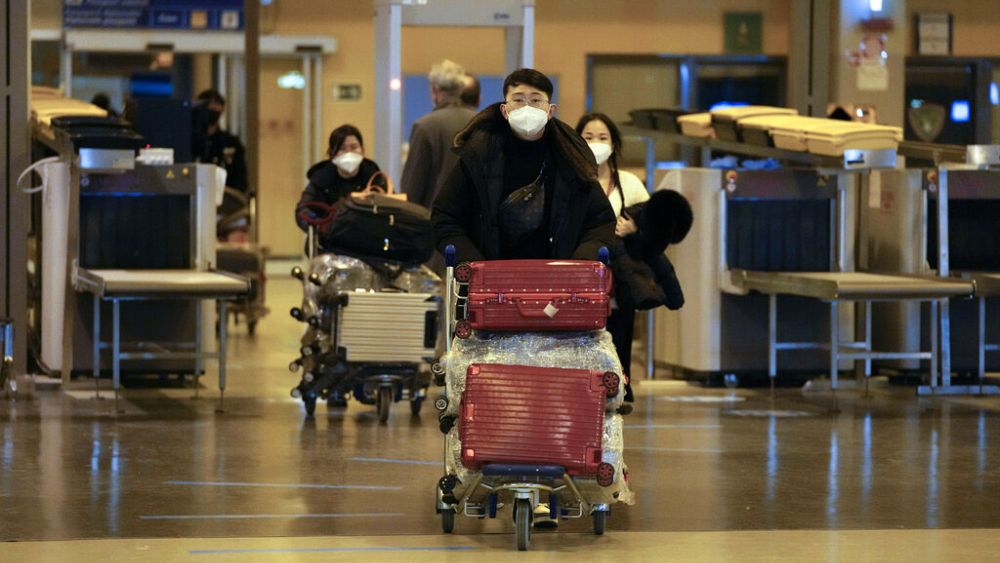After three years of pandemic, the whole world is paying attention to China again.
It seems that history is repeating itself: the Chinese New Year is upon us, with hundreds of thousands of people who have already planned to return to the country or to visit relatives abroad and the borders have been open since 8 January.
Even the measures on the table and under discussion these days recall those already taken a few years ago.
On December 26, 52% of passengers on a flight that landed at Milan airport tested positive for COVID-19.
Several countries have decided to implement restrictions, including the United States, Japan, Japan, Taiwan, Malaysia, India and Italy. Spain was the latest to join the requirement of a negative test for those coming from China.
Euronews spoke to the director of the coronavirus laboratory at the National Center for Biotechnology (CNB-CSIC), Luis Enjuanes, and ICREA researcher at the Barcelona Institute for Global Health, Quique Bassat, to find out the keys to the outbreak of infections in China.
Why has the zero Covid policy in China had a rebound effect?
During the pandemic years, the Chinese population was subjected to strict tracing measures and consequent confinement measures to nip the virus in the bud.
What was initially viewed favorably by the population, since it placed the country in a more favorable situation than the West, ended up having the opposite effect. After the protests, China has decided to opt for a lightning opening.
“The West began to open up gradually. This has allowed people to become infected with Omicron, which is an attenuated virus. Since this variant runs a lot, it has strengthened the immunity of the population,” says Enjuanes.
“In China, there hasn’t been that opportunity for people to have significant immunity,” adds the virologist.
The Asian giant has avoided the natural contagion of the population at all costs, which is why, for the researcher of the Institute for Global Health, China is experiencing what was the first or second wave of COVID-19 in West.
“The zero Covid policy was hardly sustainable. The move would have gone very well for them if the virus had stopped circulating, but understanding that the virus will continue to circulate and that it will stay with us for a long time, they had to make this decision at some point,” says Bassat. .
“The problem is that, by taking it so abruptly, they have given free rein to the circulation of the virus and pose a huge risk to the population,” he says.
Are Chinese vaccines less effective?
Another factor both scientists point out is that the Chinese population is not very protected by vaccines. While in Spain almost 92% of the population over 12 is vaccinated with the full regimen, in China this figure is halved.
“Only 45% of citizens are vaccinated, with which the degree of protection cannot be compared to what we have in Spain,” says Enjuanes.
Added to this is the fact that the country’s two vaccines, Sinovac and Sinopharm, have proven to be less effective than those inoculated in the West (Pfizer-BioNTech and Moderna).
“What has been learned is that to get reasonable protection, similar to what we got with two doses, three doses of the Chinese vaccines are needed,” Bassat says.
“The percentage of the population that has this type of coverage in China, which would be the minimum necessary to be well protected, drops dramatically. And, above all, it falls on the most vulnerable groups ”, he adds.
Could vaccination stem the tide of COVID?
In the midst of the social upheaval caused by the outbreak of protests, the Chinese Executive has announced, through the National Health Commission, its intention to “accelerate” the vaccination of over-80s, a population group in which only 66% are fully immunised.
The goal was also to raise the rate among people aged 60 to 79. The limited vaccination coverage of the elderly worried the authorities.
The CSIC virologist argues that opening the country so abruptly, in terms of national and international movement, without ensuring an effective vaccination campaign was a mistake.
“It was supposed to be the other way around. After negotiating with the population that changes and opening up would come but that it had to be done slowly. First vaccinate massively and then start lifting the restrictions ”, he points out.
According to the ISGlobal epidemiologist, vaccination will not be able to stop the wave of Covid that China is suffering since the variants are independent of the vaccines used. That is, they don’t prevent contagion, but they do prevent serious illnesses.
“Regardless of the fact that there are millions of infections per day, what can be avoided with vaccination is that there are millions of deaths per day,” Bassat points out.
What impact will the wave of Chinese infections have on the West?
Everything indicates that the explosion of infections will continue to grow within China’s borders, but the big question is whether it will reach the West.
Both experts agree that it will have an impact on the Western world, but it will be minor. New waves are very likely to occur in Europe, however, clinical involvement should be relatively low in our context.
“There will certainly be a cascade of infections, because when you have millions of cases in China, the flame of transmission is fanned. It’s impossible to stop him. Now restrictive measures can be put on the entry of countries that with so many infections are very difficult to contain ”, says Bassat.
“It is true that one has the feeling of having come full circle, but this does not take us by surprise. He surprises us with a very well protected company. I would worry more about those countries where vaccination is not so good,” she says.
“There is a high risk that the virus will reproduce and start circulating again in a very aggressive way and end up causing deaths,” he adds.
Does it make sense to request a PCR for travelers from China?
Health Minister Carolina Darias has announced that Spain will require a negative covid test or the full covid vaccination program at Spanish airports for travelers from China.
The implementation date of the provision is yet to be confirmed, but the device is already being prepared.
The virologist comments that when a colleague of his traveled to China, she was confined to a hotel for a week before being able to travel freely and visit her family.
“We also have to do an equivalent thing,” he says.
“If the test that travelers are given is negative, then they should be allowed to pass like everyone else. However, if this is not the case, some measures should be taken to ensure that the virus does not spread throughout our country or any other country in the European Union. This is what the United States does,” ditch.


